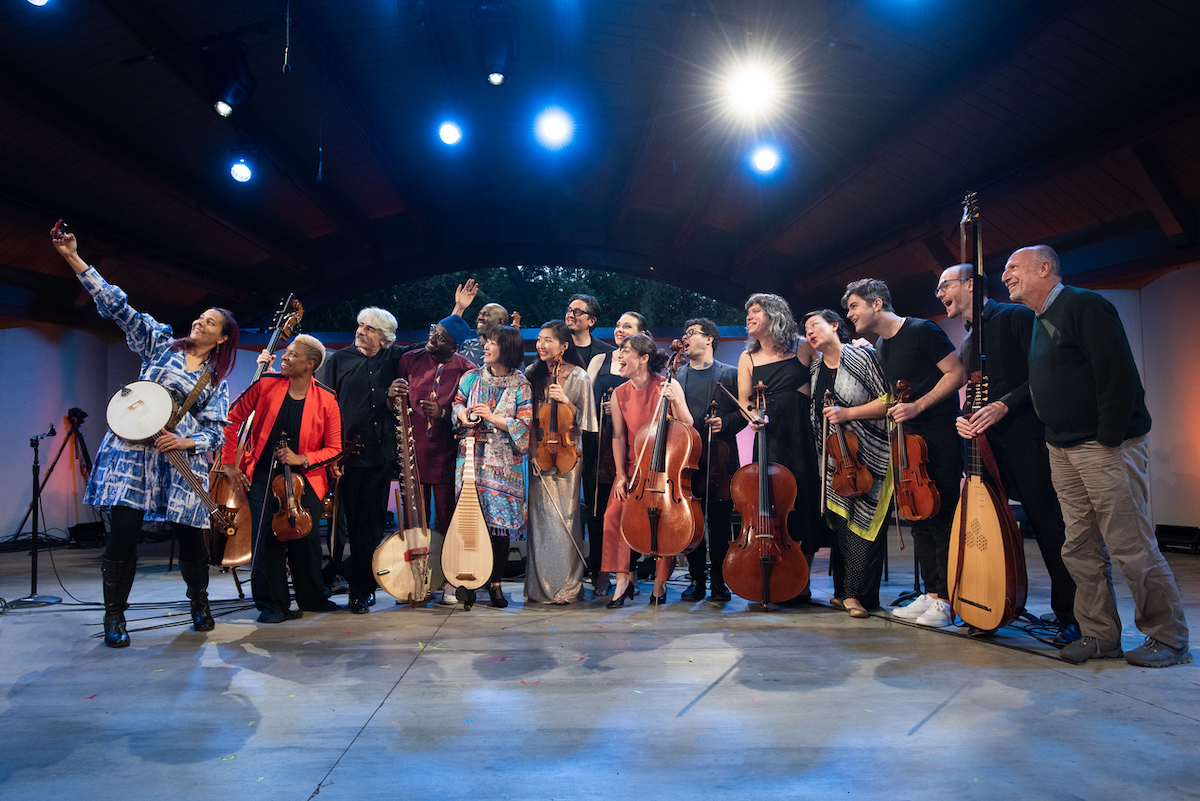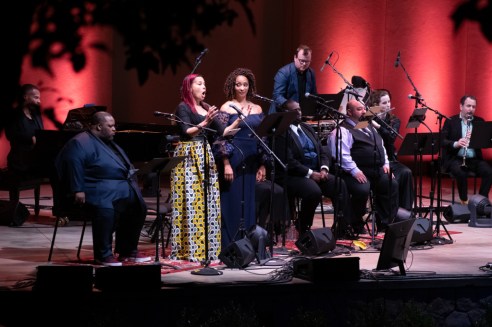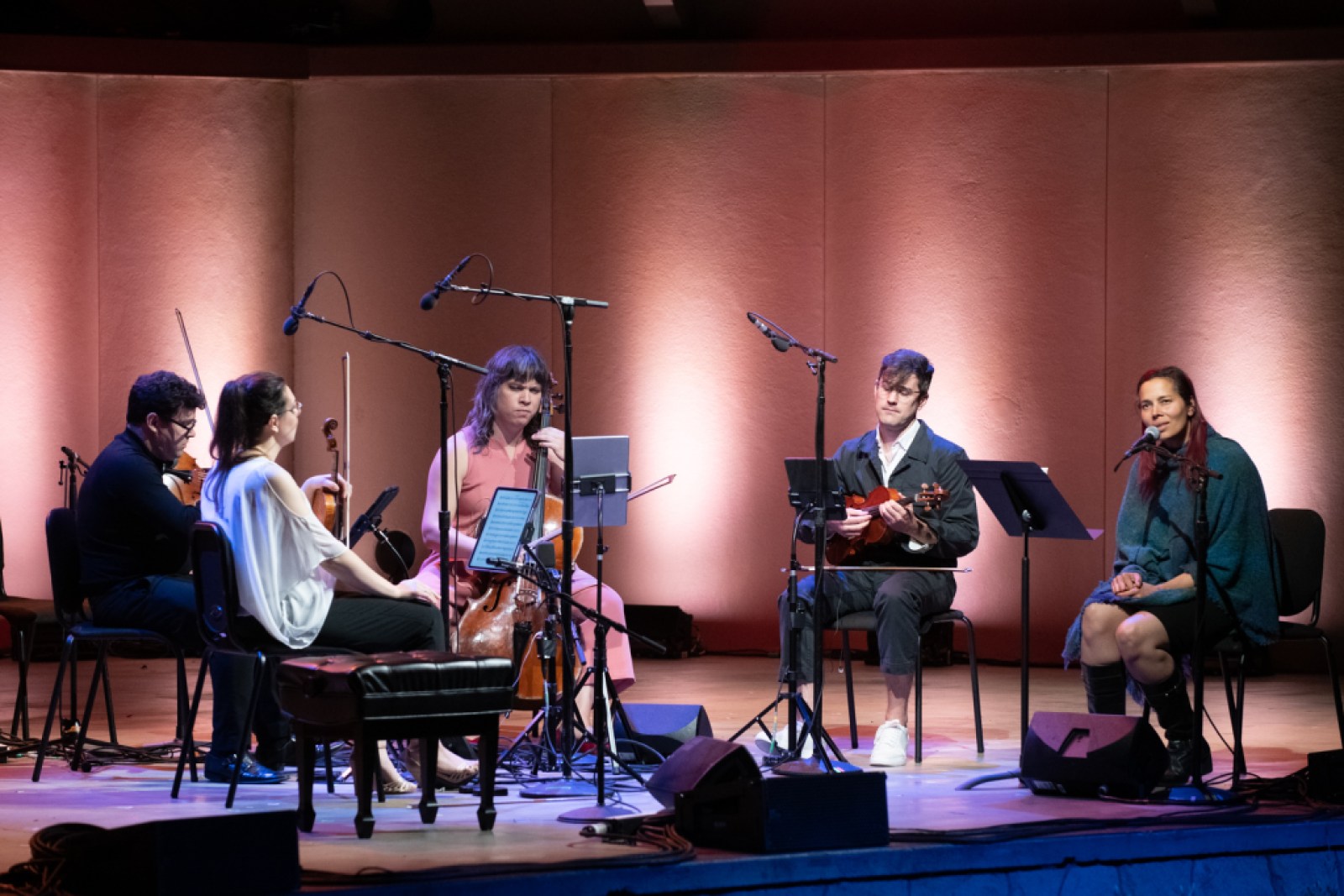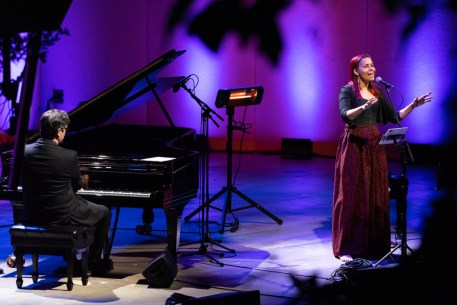Rhiannon’s Journey, Ojai Takes It Easy
The 77th Ojai Music Festival, with Rhiannon Giddens as Music Director, Offered Rewards While Deviating from the Famed Festival’s Primary Objective

Last weekend, the Ojai Music Festival descended on its idyllic host town — idyllic even in gray-to-drizzly weather — and proved once again why it remains one of the greatest and most significant cultural events in the 805. By design, this festival, now up to its 77th edition, is built on strengths of both consistency and diversity, and this year’s model, boldly designed and led by the radiant and exploratory Rhiannon Giddens, pushed the diversity button more than usual.
OMF 2023 is ultimately best appreciated for what it was, not what it wasn’t. The four-day program gleamed in terms of supporting the view of Giddens as a still-rising national treasure. She was primarily showcased in a duet concert with her partner (in life and music) Francesco Turrisi on Friday night and with Saturday night’s Omar’s Journey, a chamber-ized new version of her recent opera Omar, which earned the Pulitzer Prize for her and her composer collaborator Michael Abels. The Pulitzer now shares her mantle with a 2018 MacArthur Grant.

Giddens also showed up for brief onstage moments throughout the festival, with her powerful presence as impassioned genre-hopping vocalist, banjo player, and fiddler. She even wowed the overpacked Chaparral Auditorium crowd of young and old at the reading/song event for her new children’s book, Build a House. Among the jewels of her pop/blues-oriented duet concert were blues outings by Alberta Hunter and Ethel Waters, her stunning take on Paul Simon’s Bach-inspired “American Song” (her version should be considered among the best interpretations to date), and Shawn Okpebholo’s haunting beauty of an art song, “Ahmaud,” about the cruelly murdered Georgian runner Ahmaud Arbery.
On the other hand, this year’s festival program was something of a stylistic anomaly in terms of this festival’s main agenda and purpose — to champion contemporary classical music and shades of modernism stretching over the past century. By that well-established institutional measure — which has made the festival an international sensation and landing place for such icons as Stravinsky, Copland, Boulez, Messiaen, John Adams, and many others — this year’s event often turned to more accessible zones of folkloric, pop, and generally genial fare. It also had the desired effect of luring new and different demographics.

That said, though, the weekend was full of fascinating and thoughtful music, as well as Giddens’ strong social and historical conscience in her work. Themes and echoes of slavery and other Black American injustices serve as a powerful, ongoing subject and point of research for Giddens, as heard in her duet concert’s opening song, “At the Purchaser’s Option,” and as the illuminating saga of Omar, based on the writings of Muslim scholar-turned-slave-turned slave/scholar Omar ibn Said.
Resonances of slavery-related themes also showed up at the Greenberg Center auditorium, in the form of composer Carlos Simon’s Between Worlds. A Smithsonian exhibition of art by former slave Bill Traylor (1853-1949) inspired Simon’s alluring and genre-flexible pieces for solo string instruments, with fragments of Traylor’s art as a visual backdrop to the performers.
Interestingly, Thursday night’s opening concert with the Attacca Quartet (a group that made its Santa Barbara debut at Hahn Hall this spring) and Ojai regulars, percussion group red fish blue fish, opened with a short piece by the recently-belated Finnish composer Kaija Saariaho, sensitively played by red fish founder/leader Steven Schick. This festival was dedicated to Saariaho, a focus of the 2016 OMF, but little of this year’s program approached the level of her uncompromising and sometimes atonal music.

In the main, the contemporary classical focus this year turned into a rich sidebar showcase of “serious music” by Chinese-American and Iranian artists (from the Iranian Women Composer’s Association). Brilliant Iranian kamancheh player Kahan Kalhor appeared in various spots, including an engaging solo improvisational invention on Saturday morning.
Among the standout music of Chinese origin was an expanded version of Tan Dun: Ghost Opera (written for the Kronos Quartet in 1994). In this version, its mesmerizing ritualistic staging was enhanced by pipa master Wu Man, a strong presence in Ojai this year, and lithe-bodied/minded Taiwanese dancer/choreographer PeiJu Chien-Pott.
Other Chinese music seizing my senses was the utterly bewitching Echoes from the Gorge, by the influential yet underrated composer Chou Wen-Chung. Echoes was exactingly performed by red fish blue fish in the first of three 8 a.m. concerts — programmed for eager early birds and/or completist music nerds, present company included.
Chou’s music bewitched again in the form of The Willows are New, a calligraphically impressionistic solo piano piece delivered with due sentience by Gloria Cheng. That same Saturday morning concert also featured the ever-compelling Wu Man and Attacca violist Nathan Schram on Lei Lang’s Mother’s Song, as well as Iranian composer Niloufar Nourbakhsh’s Veiled, lovingly rendered by cellist Karen Ouzounian.
Come Sunday, the rippling hypnotic goodness of the Senegalese Seckou Keita’s kora massaged early morning ears on a wet day in Ojai, followed by the Turrisi-curated and winkingly titled “Early Music” program in the Libbey Bowl. Ranging from 17th century Italian music for the giraffe-necked lute called the theorbo (Joshua Stauffer) to a piece by Monteverdi with Giddens in vocal control as usual, to “medieval minimalist” Arvo Pärt and the Giddens/Turrisi ballet Black Lucy and the Bard, the morning concert proved a journey both shamelessly broad and emotionally cohesive.

Sunday’s finale concert — a slot which often features a program both substantial and celebratory — proved anticlimactic, leaning into the celebratory factor and settling for loose, improvisational party timing. The prize moment there: a sonically and culturally empathetic duet between Wu Man on pipa and Giddens on that African instrument, the banjo. Giddens even extended her linguistic range into Chinese song, for our listening and admiring pleasure.
Thankfully, Giddens has been no stranger to the area, and the trend officially continues. UCSB Arts & Lectures has announced two (count ‘em) Giddens appearances in the 2023-24 season, as director of the Silk Road Ensemble (November 9, Granada Theater) and as herself, in the program “You’re the One” (April 23, 2024, also at the Granada).
Ojai Music Festival diehards and regulars can take heart in news of next year’s music director, pianist Mitsuko Uchida, who will no doubt return to the regularly scheduled program after this year’s delightful diversion.





You must be logged in to post a comment.